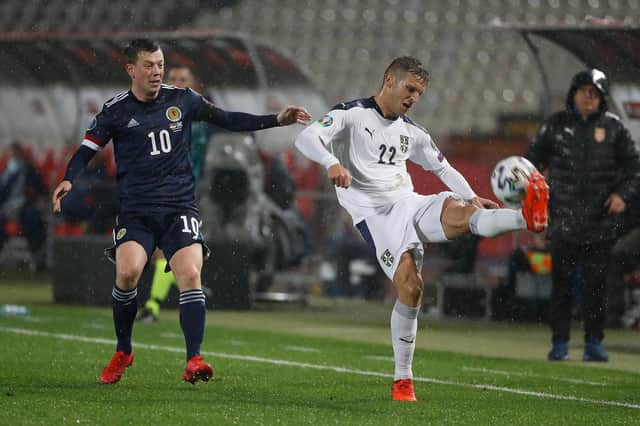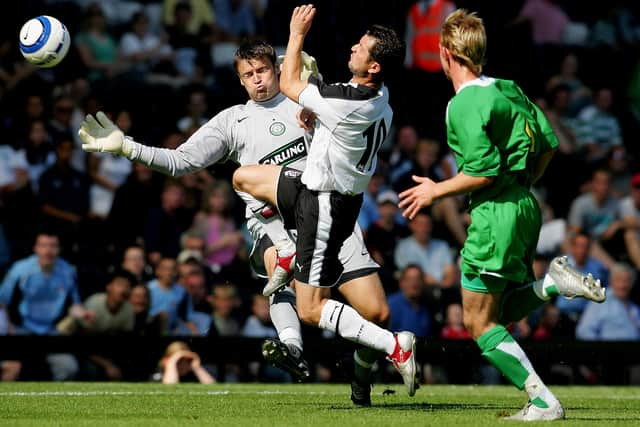Time for Celtic supporters to celebrate Scotland success as their own - because it has green-and-white-hooped hallmark


In all, no fewer than eight players with Celtic connections were involved in the white-knuckle ride of a penalty shoot-out success over Serbia that has allowed a flag to be planted in Euro 2020 territory. Apposite, really, since no fewer than eight Celtic players were in the squad for a France 98 that is the other bookend for the 23 years Scotland have been AWOL from such jamborees.
Indeed, in the modern age, there seems to be something about Celtic and special times for the country on the international stage. A fact that makes the uneasy relationship elements of the club’s support have traditionally had with the national team difficult to fathom.
Advertisement
Hide AdAdvertisement
Hide AdSo much emotion and telepathy


Ancient grievances really should be cast aside when a Celtic player can be so moved - and so moving - reflecting on his role in giving this country the finals appearance it has interminably craved. Ryan Christie’s outpouring of emotion that led to the tears flowing ought to have provoked the same reaction among all followers of his club. For this was a glory, as with Scotland’s World Cup campaign for France 98, that can be basked in with reflected pride for those holding Celtic allegiances.
Christie’s strike in Belgrade followed telepathic interplay with Callum McGregor. It was, then, forged in Parkhead. Scotland created a platform enabling them to prevail on penalties because Leigh Griffiths and McGregor had the gumption and guile to slam in the opening two, tone-setting, spot-kicks. Indeed, Griffiths demonstrated nerves of steel to step up for the very first penalty when he had not touched the ball in his brief, extra-time appearance.
All of this before David Marshall, a man whose footballing education and senior and international breakthroughs came at Celtic, fashioned the save to seal the end of so much sorrow. Marshall’s professional background has a number of parallels with that of Kieran Tierney, another graduate of Celtic’s academy whose grounding in the east end of Glasgow paved the way for his £25m move to Arsenal 15 months ago. A further three players that served Steve Clarke and the country with such distinction on Thursday also were once adorned in Celtic colours, even if only as pimply youths. A bracket into which, to varying degrees, Andrew Robertson, Declan Gallagher and Stephen O’Donnell can be placed.
As history shows


The links were far more direct for Craig Brown’s France 98 squad, with Tom Boyd, Craig Burley, Paul Lambert, Jackie McNamara, Tosh McKinlay, Darren Jackson, Jonathan Gould and Simon Donnelly then all fresh from doing their bit to ensure Celtic claimed a first league in a decade that famously ‘stopped the 10’ for Rangers.
Further consider that under Gordon Strachan, and especially for the narrow miss of 2016 World Cup qualifying campaign, the Scotland team would regularly feature six Celtic players. Across recent times, the country’s dominant club have pretty much enjoyed that status in the terms of dark blue representation.
Uncomfortable landscape
Yet, still a section of the club’s fanbase choose to be sniffy about the national team. Celtic describe themselves as a Scottish club proud of their Irish roots. To those who see the Republic of Ireland as their de facto national side, it seems the impetus their club drew precisely through being based in Glasgow is too readily dismissed.
Celtic may have been a club formed to raise funds to alleviate the poverty suffered by Irish Catholics immigrants to the city’s east end, a minority group then the victims of discrimination as well as deprivation. The victim card, though, now deserves to be cast aside in understanding what Celtic means to Scotland, and vice versa.
It is true that even as late as the 1970s, there were reasons for Celtic supporters to feel their players suffered prejudice in the Scotland domain. It remains shameful that Jimmy Johnstone and Davie Hay were both booed by the pre-Tartan Army followers of the national team – then mainly those with a Rangers leaning – because these supporters’ preference for those positions were fine, but lesser, performers who called Ibrox their club home.
Advertisement
Hide AdAdvertisement
Hide AdDalglish situation
Equally, it remains inexplicable that Kenny Dalglish was denied a 34th consecutive Scotland outing in May 1976. An appearance in a Home International against Wales then would have allowed the Celtic striker to equal the record for successive internationals held by storied Rangers captain George Young. Dalglish was at that juncture in excellent form for club and country. However, Willie Ormond shocked all not just by failing to select him, but through electing not to substitute him late on, despite Scotland boasting an unassailable 3-1 lead.
In his autobiography, Dalglish speculated that Ormond – who reinstated him for the next Home Internationals against Northern Ireland and England, two games he just happened to score in – had been pressurised from within the SFA not to allow a Celtic player to claim a Rangers legend’s Scottish record. Dalglish thereafter started 34 straight internationals to claim the record as a Liverpool player, but that dubious omission against Wales denied him Billy Wright’s all-time record for consecutive such appearances, the England man having turned out for his country 70 times on the spin.
Time to move on
Those days are gone now, and in the past they should remain. Christie, McGregor and Griffiths are three of the most popular players on the Scotland international scene. Moreover, no national manager since Ormond has been other than desperately keen to field indigenous Celtic players, recognising that the level at which the club operates prepares these indiividuals for the peculiar intensity of international football.
All Celtic supporters should recognise, as unquestionably do those from the club honoured to represent their country, that Scotland success warrants communal celebration from each and everyone of us that call this little nation home.
A message from the Editor:
Thank you for reading this article. We're more reliant on your support than ever as the shift in consumer habits brought about by Coronavirus impacts our advertisers. If you haven't already, please consider supporting our trusted, fact-checked journalism by taking out a digital subscription.
Comments
Want to join the conversation? Please or to comment on this article.